The Lilith Blog
October 11, 2017 by Melanie Takefman
The Loneliness of Yizkor When You’re a Young Woman
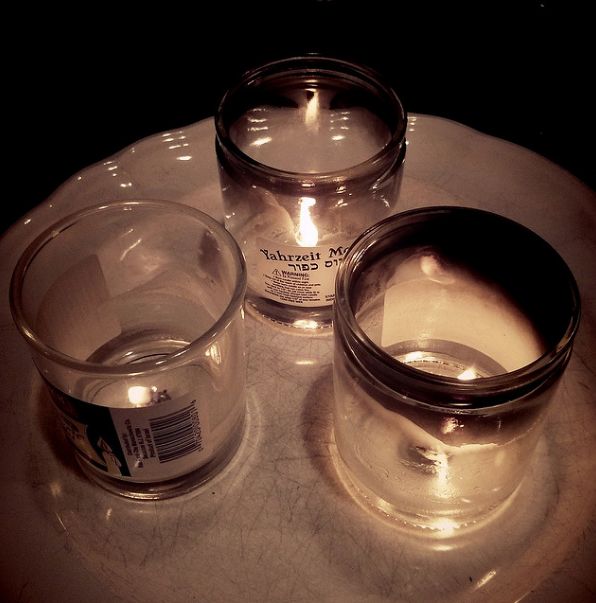
Photo credit: Kevin Skobac
With the month of Tishrei upon us, the mourners of Zion are in the midst of a Yizkor double-header.
Jewish mourning liturgy is dauntingly public. In most communities, the mourners stand and recite the prayers aloud or silently, while the rest of the congregation exits the room or sits and waits until it’s over.
Reciting the Jewish prayer of mourning, Yizkor, and its sister, Kaddish, has always been a lonely endeavor for me, because I’m a woman and many daily minyans still cater primarily to men. Even though more women have adopted this tradition in recent years, we are nevertheless an anomaly.
There’s another layer to my solitude. I’m always the youngest mourner—by far. I was 21 when my father died. Seventeen years on, I’m still young to be doing this.
- 5 Comments
October 10, 2017 by Elana Sztokman
Why Are Women Dropping Out of Synagogue Life?
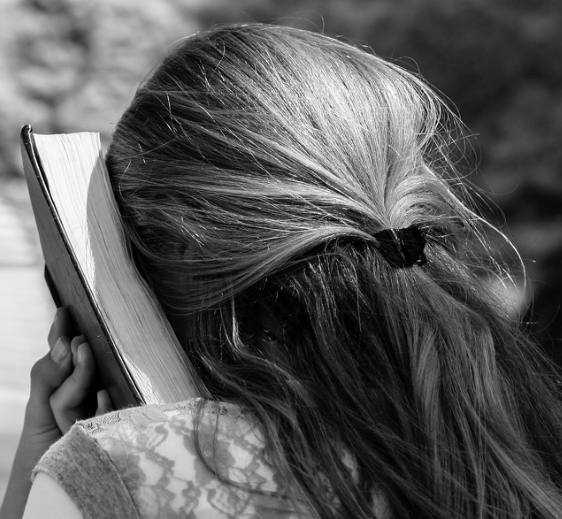
Photo credit: Sharon Riddick Groppi
One Friday night in an Orthodox synagogue in Jerusalem 10 years ago, a woman was standing in the back of the sanctuary rocking her hips, soothing her fussy baby. A man walked up to her. She thought to herself, maybe he is coming to welcome me. Instead, he leaned into her and said, “If your baby is making noise, you need to leave the sanctuary.” She left – and never went back.
Exchanges like this have taken place in countless congregations around the world. It is one of the myriad of scenes in which women are made to feel unwelcome. The question is, how are women responding?
In researching this article, the women I spoke to all said that synagogue was once important to them, but that now they are without a congregation to call home. They live in Israel, North America and the UK and are between their twenties to their sixties. They are predominantly Orthodox, but not exclusively. They dropped out of synagogue for a variety of reasons, each of which presents its own biting critique of Jewish communal practices.
“The rabbi noticed I wasn’t there,” reports Aviva, a 40-year-old mother of three from the United Kingdom who stopped going to services two years ago. “He said, ‘We missed you’, but never actually asked the question about ‘why’. I was dying for him to ask. But he never did.”
Consider “Nadia” (name changed at her request, as are those of the other women I interviewed). ) On the Friday night that she led the Kabbalat Shabbat services in her “partnership minyan,” (an Orthodox service that separates the sexes but allows women to lead certain parts of the service). She made a one-word change to the song “Lecha Dodi.” Instead of using the word “ba’alah” (literally, “her owner”) to designate “husband,” she used the word “isha” (literally “her man), a word that is used in many feminist spaces in order to avoid the connotation that women are property. As a result of this change to the liturgy, one man in her shul was incensed. He started circulating around the men’s section in fury, trying to rile people up. Unsuccessful, he simply went to the podium and announced, “This woman does not represent the community. We are not Conservative.” Nobody reacted or told him to stop. Nobody said that it wasn’t his place or his role to speak on behalf of “The Community.” And not one person in the synagogue approached Nadia to apologize for her being humiliated this way. Nadia never returned to the congregation, and nobody seemed to care. The man who humiliated her stayed for many years, and was given many honors. Life went on without her.
These are not stories of cloistered Hassidic women breaking free with great drama. These are educated, modern women who quietly slip away from a communal life in which they feel unwelcome or unwanted. A mid-life rebellion may not even look like one. These quiet, private rebellions—which result from experiences around gender inequality, social isolation, or public shaming—have not evolved into a movement, but they reflect what might be a significant trend in communal life. Tinged with loneliness, frustration, sadness and liberation, their narratives offer a powerful about the tremors beneath the surface of deceptively happy Jewish communities.
- 6 Comments
October 9, 2017 by Trina Robbins
How I Turned My Father’s Yiddish Book Into a Graphic Novel

Cover art for A Minyen Yidn created by Barbara “Willy” Mendes.
I will never know what possessed my parents to move to South Ozone Park, Queens. Perhaps they thought it was a step up from Manhattan’s Lower East Side, where they had lived and met, or perhaps they liked the fact that our house was across the street from a school and within walking distance of another school, where my mother taught second grade. But it was an Irish and Italian Catholic neighborhood in which we were the only Jews for miles, and as a result I grew up always feeling like an outsider, always wanting to belong. I wanted to be like the little girls on my block who dressed up like little brides for their confirmation!
Holidays were the worst: Easter, when all the other girls dressed up and went to mass at Saint Theresa’s, right around the corner; Christmas, when all the other houses—especially the Italian houses—piled on the decorations: Santa and his sleigh and reindeer on the roof, the entire holy family on the lawn, all outlined by colored lights. How could mere candles compete?
To make matters worse, my father wrote in Yiddish. Brought up speaking Yiddish and Russian, he had come to America on his own at the age of 16, from a little shtetl in what is now Belarus. He’d learned English in night school and was a fluent English speaker and reader, but he wrote in Yiddish—articles for the Yiddish language newspapers that proliferated in New York in those days—and in 1938 he had written a book, titled A Minyen Yidn un Antere Zacken, loosely translated as A Bunch of Jews and Other Stuff.
I loved both my parents very much—my mother had taught me to read at the age of four, and my father regularly took me to museums and, despite his hay fever, to the Brooklyn Botanical Garden—but I wanted nothing to do with the Jewish part of them. So, although I knew about the book, I ignored it, had no idea what it was about, and didn’t care.
Years pass, and some people finally grow up, even ungrateful daughters. Almost half a century after my parents’ deaths, my grown daughter, much more interested in our heredity than I had ever been, searched the internet and found A Minyen Yidn, which by then I had decided was lost forever. By then, the years had put some sense into my head and, coincidentally, I was taking Yiddish classes. No, I didn’t translate the book myself—I’m a complete failure in written Yiddish, though I now love speaking it—but with the aid of the Yiddish library, I found Hershl Hartman, a translator living in Los Angeles, who translated it beautifully.
- 1 Comment
October 3, 2017 by Eleanor J. Bader
Improving the Lives of Ethiopian Women with Fistula: An Interview with Dr. Gladstone
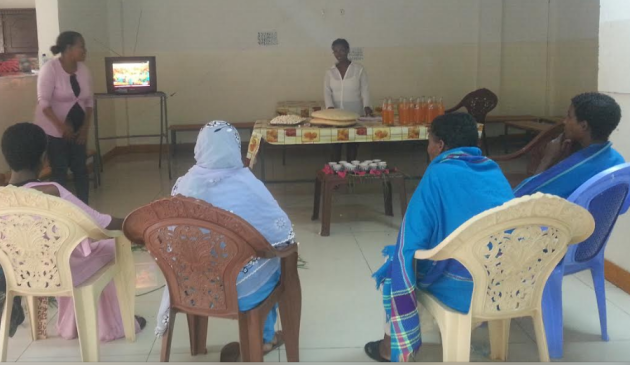
One of the nurses and the fistula patients in her group, taken at the final group meeting, which is a celebration. Photo courtesy of Dr. Gladstone.
When Dr. Tracy R.G. Gladstone visited Ethiopia’s Gondar Fistula Center in 2015, her goal was to train medical providers to address depression and anxiety in women with obstetric fistula: a hole in the tissues that separate a woman’s vagina, bladder and rectum. Fistula develop during obstructed childbirth when a timely caesarian section is not performed.
“Over the past several years I’ve seen growing recognition of obstetric fistula as a medical issue—non-Governmental Organizations (NGOs) have begun bringing mobile health units into rural areas to provide free repair surgery to women who need it—but not as much attention has been paid to pre- or post- surgical psychological health,” Gladstone, Associate Director and Senior Research scientist at the Wellesley Centers for Women, told Lilith.
Nonetheless, as the connection between physical and emotional health is better understood, Ethiopian medical workers have become increasingly receptive to learning concrete strategies to help women deal with their post-traumatic stress and other psychological problems the condition triggers.
That said, obstetric fistula remains a serious problem throughout much of sub-Saharan Africa and Asia, though it is almost never seen in North America. It is estimated that 39,000 Ethiopian women suffer from fistula. According to The Fistula Foundation, the country has just one physician per 10,000 people. What’s more, 41 percent of Ethiopian women are illiterate and female life expectancy is 67.4 years.
Gladstone became interested in the psychological issues surrounding fistula in 2010, after her pre-teen daughter, Sarah, read Sheryl WuDunn and Nichola Kristof’s book, Half the Sky. Sarah, Tracy Gladstone reports, was so incensed by what she’d read that she decided to raise money for fistula repair as a Bat Mitzvah project. Since then, Sarah has raised more than $10,000 for the effort.
In tandem with Sarah, Tracy Gladstone has created the COFFEE Project: Cognitive Behavioral Therapy with Obstetric Fistula for Education and Empowerment. She recently spoke to Eleanor J. Bader about her work.
- No Comments
October 3, 2017 by Betsy Teutsch
Marching for Racial Justice on Yom Kippur
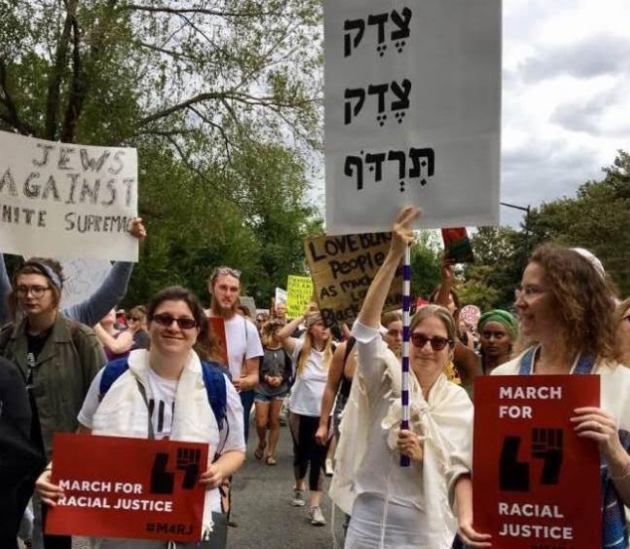
Photo credit: Susan Wasserkrug. The “tzedek, tzedek tirdof” was created by Lynna Schaefer. Carrying the red sign on the left: Rabbi Amber Powers. Carrying the Tsedek sign: Betsy Teutsch. Carrying the red sign on the right, Lynna Schaefer
Ironically, I heard about the March for Racial Justice via an explosion of disapproval and upset on the Sisters of Salaam Shalom Facebook group. Member after member expressed outrage that the march’s organizers had ignored Jewish needs when scheduling the march.* Learning that the march was sparked in response to the acquittal of Philando Castile’s killing by a police officer, streamed by his girlfriend sitting next to him in his car, I instantly decided to go.
Marching as a white Jewish ally to African-Americans traumatized by generations of systemic brutality struck me as a constructive, stirring way to observe Yom Kippur. September 30th was also the anniversary of the Elaine Massacre in 1919.
Full disclosure: After 40+ years of sitting in shul by my rabbi husband’s side on holidays and 52 shabbat mornings a year at our Minyan, Dorshei Derekh, I get pretty restless spending all day in shul on Yom Kippur. Opportunities to pray with my feet appeal to me.
Yes, Jews were allies in the Civil Rights era. But we can’t just rest on that cred. That was in my childhood—and I am 65 years old!
- 1 Comment
October 2, 2017 by Danica Davidson
An Interview with Eva Schloss, Anne Frank’s Stepsister
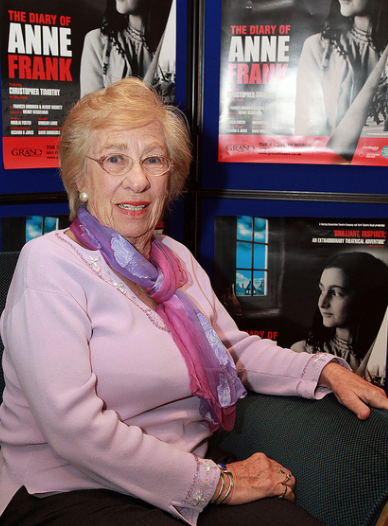
Eva Schloss
Eva Schloss is an Auschwitz-Birkenau survivor, author, Holocaust education activist — and stepsister to Anne Frank. She travels the world to tell her story, and on September 7 she was at a Western Michigan University event presented by the Chabad of Kalamazoo. She was interviewed by her close friend and now co-presenter, Dr. Tami Weiss, Professor of Art Education at the University of Wisconsin-Stout. Weiss met Schloss in 2015 when she produced a play about Eva’s life, And Then They Came For Me: Remembering the World of Anne Frank by American playwright, James Still.
Schloss told about how she escaped Vienna after the Auschluss with her parents, Erich and Elfriede (Fritzi) Geiringer, and her older brother Heinz. They eventually settled in Amsterdam, where she became friends with her neighbor, Anne Frank, who was the same age. In 1942 the family went into hiding, and in 1944 they were betrayed by a Dutch nurse who had pretended to be helping but who was really a double-agent for the Gestapo. It was Schloss’s 15th birthday.
On the train to Auschwitz, Heinz told Schloss about paintings he’d made in hiding and had concealed below floorboards. Erich and Heinz perished days before liberation, and when Schloss later went in search of her male relatives in the men’s part of the camp, she came across Anne’s father Otto Frank instead. The three survivors—Schloss, Fritzi and Otto Frank — eventually drew close, and Fritzi and Otto married, thus making Schloss Anne’s stepsister.
After liberation, Frank came into possession of his daughter’s diary, crying repeatedly as he read it over the course of three weeks. Schloss, meanwhile, found her brother’s hidden paintings right where he’d said they’d be—under the floorboards of the place where he was in hiding. Schloss’s books, Eva’s Story and The Promise tell this story, and more. I asked Schloss about her experiences.
- No Comments
September 29, 2017 by S. L. Wisenberg
Hagar, or: The Handmaid’s Tale
Introduction
You may recall the story of Sarah, Abraham, and Hagar. We read about them on the first day of Rosh Hashanah, from Bereishith in Genesis. The crone Sarah is barren, so she gave “Hagar, the Mitzrite woman, her maidservant” to Abraham to bear a son for him. Later Sarah has her own child, Yitzhak, and thinks that Ishmael, the son of Hagar her handmaid, is mocking her. In response, she tells Abraham: “Cast out the handmaid and her son, for the son of this handmaid shall not inherit together with my son Yitzhak.” Abraham is reluctant. God has told him that each boy will be the seed of a great nation. Still, Abraham sends Hagar and her son Ishmael away with “bread and a skin of water.” Hagar becomes lost in the wilderness and leaves Ishmael under a tree because she cannot bear to see her son die. Eventually, God leads her to water and they survive. Ishmael grows up, becomes a “great archer,” and marries.
Rabbis tell us that Hagar was an Egyptian princess.
You never forgot: you were a princess. You had ladies in waiting, too many to count, who poured sweet oil onto your skin and made your arms lacy with henna. You had men, many men. They brought you gold and silk scarves and more girls to tend to you, to plait your hair. But these men really had nothing to offer. They were dull.
You had nothing nothing to do. Then came the visitors and you saw how Abraham and Sarah were favored by god. You wanted to be with them, even if you had to lower yourself, become a maid yourself. You wanted to learn the secret of their power.
He knew you would satisfy him, that was why he took you. He wanted your fire, which he consumed, yes, but re-ignited. His touch was arousing, always. I am satisfied, that’s what he said. I am so satisfied.
He always said it was her idea, Sarah’s. She wanted you to provide children for her. One after another.
His wife was too old. That was the simple fact.
In time, the inevitable. So maybe you did complain—you were dizzy in the morning. Your limbs felt so heavy. You could no longer carry in the great bowls of water. Sarah watched your belly grow and said, You are still young and still strong. It wouldn’t hurt you to bring me the usual bowls and baskets. She said, You were a princess in Egypt. You’re not in Egypt.
She said: You are here for one purpose.
She said: How do we know it’s his? It could be anyone’s.
You boiled inside and all he would say was: Women must patch their own quarrels.
You ran away and the angel led you back, telling you lies. That you would become a leader and a shaman. Others would follow you and seek your wisdom. You imagined lines of the penitent and perplexed, waiting to hear your judgment. Hanging on each word.
- No Comments
September 28, 2017 by Rishe Groner
A Feminist Prayer for Yom Kippur
On this Yom Kippur day
I pray
I ask for forgiveness
Please forgive me
Divine Mother
Shechinah
Spirit of the Universe
Cosmic Creator
Forgive me
For not recognizing the body You’ve given me as Divine
for disrespecting the earth that is Your body
Strewing it with styrofoam and plastic trash
As I’ve strewn my own body with self-loathing, judgment,
Dear Goddess
Please forgive me
For not embodying You
And behaving with compassion
Communicating with my heart
Instead of my head
To the Supernal Divine
Infinite Mystery
That fills the universe
Forgive my errors in judgment
Of harshness and rashness
As I’ve failed to recognize
That I too am divine
As are You
And You are within me
Forgive us
As a society
For telling boys to man up
For criticizing women who are too needy
And boys who are too emotional
For calling that girl a slut
For telling that woman to shut up
For competing with her in the workplace
For failing to articulate my own needs
For neglecting my own feelings and emotions
Or suffocating others with my need to serve them
Oh Shechinah
Feminine presence in the universe
Broken and battered
Tattered in clothing
Please forgive us
For rape culture
For gaming culture
For internalized misogyny
For corporate hierarchy
For religious patriarchy
For jealousy
For mansplaining
For homophobia
For abusing our trans siblings
For deflecting responsibility
For dieting excessively
For eating mindlessly
For trying to place a value on a body
That is already determined by You
To be divine
Forgive us
Divine Mother
and grant us all that You embody
Grant us compassion
Grant us collaboration
Grant us communication
Grant us the ability to listen
Grant us the ability to receive
Grant us the ability to feel
Grant us the opportunity to heal
Grant us the opportunity to express ourselves
Grant us the opportunity to cry, as the darkest depths move us through to the other side
- 2 Comments
September 25, 2017 by Lisa Solod
What My Fraught Interfaith Marriage (And Eventual Divorce) Taught Me About My Judaism
 Many years ago, when I was living with an old friend in an apartment in a big city, she announced that she was going to date only Jewish men from then on. She was adamant about wanting to marry a Jewish man, and spending time dating men outside her faith would make this less likely.
Many years ago, when I was living with an old friend in an apartment in a big city, she announced that she was going to date only Jewish men from then on. She was adamant about wanting to marry a Jewish man, and spending time dating men outside her faith would make this less likely.
I remember being both impressed and incredulous. How can you be so calculated about the person with whom you fall in love?
When I listened to my friend’s pronouncement that day, I was quite young, and so very naïve. I could not have imagined then that marrying outside my faith would ultimately cause me so many years of personal pain and physical hardship. I could not even have considered how alone I would feel once I realized how large a part my ethnicity and my faith would play in my future self.
- 7 Comments
September 20, 2017 by Rishe Groner
A Feminist Prayer for Rosh Hashanah—In Honor of Hannah

May we be blessed this Rosh Hashanah that all our prayers are answered, as Hannah’s were answered, with joy and with gratitude. May our words be heard, may our cries rise to the heavens and penetrate the skies, may they cause vibrations in the earth that shake the universe at its very core. May we all find a way to reach the heart of ourselves and connect to the Divine in our own way, and line up a year of joy, blessing, prosperity, goodness, health, abundance, magic and love to all beings.
Rishe Groner is a writer and strategist living in Brooklyn. She is the founder of TheGene-Sis.com, a post-Hasidic embodied approach to self-transformation.
The views and opinions expressed in this article are the author’s own and do not necessarily reflect those of Lilith Magazine.
- 2 Comments
 Please wait...
Please wait...